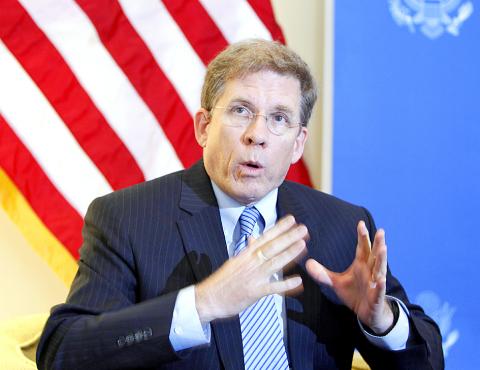A top US diplomat for Southeast Asia yesterday urged Pacific island nations not to withdraw diplomatic recognition of Taiwan, warning that Chinese pressure to change Taiwan’s international standing threatens to increase the possibility of conflict.
US Principal Deputy Assistant Secretary of State for East Asian and Pacific Affairs W. Patrick Murphy spoke to reporters in Canberra at the end of a three-day visit to Australia for talks with government officials on expanding their security alliance.
Six Pacific island nations have diplomatic relations with Taiwan, accounting for one-third of the nation’s diplomatic allies around the world, but they are under intensifying pressure from Beijing to switch allegiance as it builds its influence in the region.

Photo: AP
Murphy said that diplomatic decisions should not be influenced by China.
“China is attempting to reduce Taiwan’s diplomatic relations in the region and that’s kind of heavy-handed,” Murphy said. “It gives rise to tensions by changing the ‘status quo’ and then the possibility of conflict.”
Then-Solomon Islands prime minister Rick Hou had promised to review the nation’s relations with Taiwan before he lost power in last month’s elections.
Switching recognition to China, the Solomon Islands’ biggest export market, remains a live issue.
Murphy said that the US has “strong diplomatic relations” with the Solomon Islands and had congratulated newly elected Solomon Islands Prime Minister Manasseh Sogavare.
Murphy declined to say whether he discussed with Australian officials concerns of some security analysts that China wants to construct a deep-water military base somewhere in the Pacific.
Chinese militarization in the Pacific would be as destabilizing as its militarization of disputed islands in the South China Sea, he said.
“A growing military presence anywhere in the region of a country like China that doesn’t work on a rules-based approach or adhere to international standards is and should be of concern,” Murphy said. “We have a lot of national interests in the region that are built on freedoms of commerce, navigation and overflight. We have key partners and the establishment of a military presence there, the notion, the concept, is indeed quite troubling.”
Murphy today is due to fly to Australia’s nearest neighbor, Papua New Guinea, where pro-Beijing Papua New Guinean Prime Minister Peter O’Neill backs China’s territorial claims in the South China Sea.
The US and Australia have committed to redevelop a naval base on Manus Island.
Murphy said that the Lombrum Naval Base expansion was about a “partnership with Papua New Guinea and meeting its needs,” not denying China a military presence in the nation of more than 8 million people.
When Australia and Papua New Guinea announced the upgrade in October last year, China cautioned both nations to discard “Cold War” thinking, referring to an era when the world was less integrated.
“The Pacific island countries should not be the sphere of influence of any country,” Chinese Ministry of Foreign Affairs spokesman Lu Kang (陸慷) said at the time.

MAKING WAVES: China’s maritime militia could become a nontraditional threat in war, clogging up shipping lanes to prevent US or Japanese intervention, a report said About 1,900 Chinese ships flying flags of convenience and fishing vessels that participated in China’s military exercises around Taiwan last month and in January last year have been listed for monitoring, Coast Guard Administration (CGA) Deputy Director-General Hsieh Ching-chin (謝慶欽) said yesterday. Following amendments to the Commercial Port Act (商港法) and the Law of Ships (船舶法) last month, the CGA can designate possible berthing areas or deny ports of call for vessels suspected of loitering around areas where undersea cables can be accessed, Oceans Affairs Council Minister Kuan Bi-ling (管碧玲) said. The list of suspected ships, originally 300, had risen to about

DAREDEVIL: Honnold said it had always been a dream of his to climb Taipei 101, while a Netflix producer said the skyscraper was ‘a real icon of this country’ US climber Alex Honnold yesterday took on Taiwan’s tallest building, becoming the first person to scale Taipei 101 without a rope, harness or safety net. Hundreds of spectators gathered at the base of the 101-story skyscraper to watch Honnold, 40, embark on his daredevil feat, which was also broadcast live on Netflix. Dressed in a red T-shirt and yellow custom-made climbing shoes, Honnold swiftly moved up the southeast face of the glass and steel building. At one point, he stepped onto a platform midway up to wave down at fans and onlookers who were taking photos. People watching from inside

Japan’s strategic alliance with the US would collapse if Tokyo were to turn away from a conflict in Taiwan, Japanese Prime Minister Sanae Takaichi said yesterday, but distanced herself from previous comments that suggested a possible military response in such an event. Takaichi expressed her latest views on a nationally broadcast TV program late on Monday, where an opposition party leader criticized her for igniting tensions with China with the earlier remarks. Ties between Japan and China have sunk to the worst level in years after Takaichi said in November that a hypothetical Chinese attack on Taiwan could bring about a Japanese

The WHO ignored early COVID-19 warnings from Taiwan, US Deputy Secretary of Health and Human Services Jim O’Neill said on Friday, as part of justification for Washington withdrawing from the global health body. US Secretary of State Marco Rubio on Thursday said that the US was pulling out of the UN agency, as it failed to fulfill its responsibilities during the COVID-19 pandemic. The WHO “ignored early COVID warnings from Taiwan in 2019 by pretending Taiwan did not exist, O’Neill wrote on X on Friday, Taiwan time. “It ignored rigorous science and promoted lockdowns.” The US will “continue international coordination on infectious